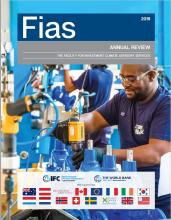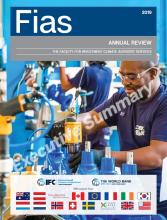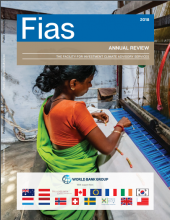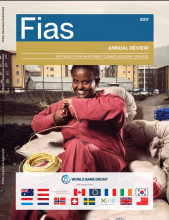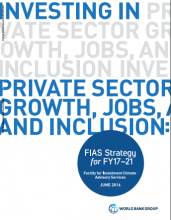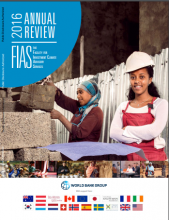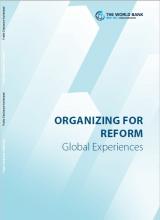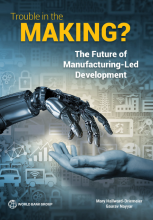Annual Review 2020: Executive Summary
In fiscal 2020, the fourth year of the FY17–21 strategy cycle, FIAS support helped bring about 20 investment climate reforms in 26 client countries, nearly two-thirds of them borrowing countries of the International Development Association (IDA). The FIAS 2020 Annual Review—Executive Summary presents highlights of this work, with a focus on the priority areas of Sub-Saharan Africa, IDA, and states in fragile and conflict-affected situations (FCS). It also details FIAS-supported rapid response by IFC Advisory Services teams to economic crises in developing countries brought on by the COVID-19 pandemic as well as support for the IFC 3.0 Creating Markets Upstream initiative. The report outlines FIAS-supported projects in 20 FCV countries in FY20, including Chad, the Democratic Republic of Congo, Guinea-Bissau, Haiti, and Kosovo.
Annual Review 2019
In fiscal 2019, the third year of the FY17–21 strategy cycle, FIAS support helped bring about 31 investment climate reforms in 18 partner countries, more than half of them borrowing countries of the International Development Association. The FIAS 2019 Annual Review describes key projects and results, with a focus on the priority areas of Sub-Saharan Africa, IDA, and states affected by fragility, conflict, and violence (FCV). The report highlights strong results achieved in 22 FCV countries in FY19, including Afghanistan, Mali, and Zimbabwe. The report also discusses implications of the COVID-19 pandemic on FIAS client countries and the implications for FIAS-supported work.
Annual Review 2019: Executive Summary
This document provides a brochure-length summary of the FIAS 2019 Annual Review, highlighting the 31 investment climate reforms in 18 partner countries achieved through FIAS-supported projects in fiscal 2019. The FIAS 2019 Annual Review highlights strong results achieved through FIAS-supported projects in 22 countries affected by fragility, conflict, and violence (FCV) in FY19, including Afghanistan, Mali, and Zimbabwe. The report also discusses implications of the COVID-19 pandemic on FIAS client countries and the implications for FIAS-supported work.
Digital Entrepreneurship and Innovation in Central America
In collaboration with the Regional Center for the Promotion of Micro, Small and Medium-sized Enterprises (CENPROMYPE), IFC conducted a study that evaluated the digital ecosystem within Central America, in which it surveyed the impact of the adoption of digital technologies of firms within the region.
Annual Review 2018
The FIAS partnership could not be more important than it is today, as we aim to generate more investment to underpin sustainable job creation and resilient economies in our partner countries. FIAS complements and accelerates our IDA 18 objectives and the IFC 3.0 strategy to achieve the twin goals of ending extreme poverty and boosting shared prosperity.
Annual Review 2017
Fiscal year 2017 marked the beginning of a new chapter in the FIAS partnership with the World Bank Group with the launch of the new FY17– 21 strategy cycle developed in consultation with our FIAS Development Partners. Our work is organized under three strategic pillars: improving the business environment, expanding market opportunities, and increasing firm-level competitiveness.
Annual Review 2016
With an ambitious new strategy and an implementing team that pulls together expertise from across the World Bank Group, the FIAS Trust Funds are moving ahead in helping client countries build stronger, more resilient and inclusive economies. FIAS—the Facility for Investment Climate Advisory Services—is now in its fourth decade supporting advisory, technical support, and knowledge-based projects tailored to help improve struggling and vulnerable economies and help make emerging economies even stronger.
Organizing for Reform Global Experiences
Document Date : January 01, 2020 Document Type : Working Paper Governments are increasingly turning their attention to the quality of the legal and regulatory environment for firms given the importance of a sound investment climate for economic growth.1 While there is a growing body of research on the impact business environment reforms can have,2 less is known about the way countries can organize to implement successful reform strategies.3 Yet, regulatory reforms often fail to materialize not because of the change they offer, but because of a lack of coordination within government. Creating institutional mechanisms that withstand the test of time and ensuring organizational buy-in increase the likelihood of reforms to succeed.
Trouble in the Making? The Future of Manufacturing-Led Development
Trouble in the Making? The Future of Manufacturing-Led Development highlights the ways technology and globalization are changing how goods will be manufactured in the future and what developing countries can do to ensure they remain competitive. The report looks at advances in technology – automation, advanced robotics, artificial intelligence, 3-D printing – to determine how they will impact jobs in developed and developing countries. (September 2017)



